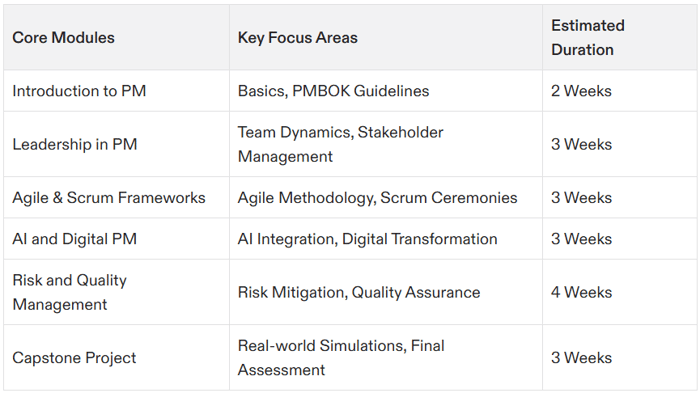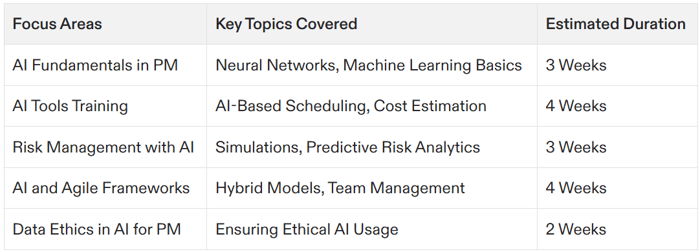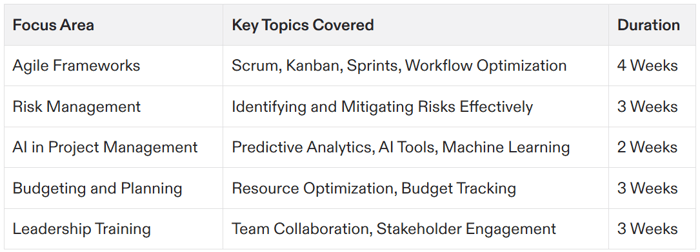Table of Contents
- What Is Legal Project Management Certification?
- Why Pursue a Legal Project Management Certification?
- Advantages of Online Legal Project Management Certifications
- APMIC Legal Project Management Certification: How It Stands Out
- Trends Shaping Legal Project Management in 2025
- Less Commonly Known Facts About Legal Project Management
- Conclusion
- FAQs
Imagine you're in a high-stakes legal battle, and your team is like a well-oiled machine, working seamlessly to deliver results. That's what Legal Project Management (LPM) does—it turns legal professionals into superheroes, saving the day with efficiency and precision. But, what makes these superheroes tick? It all starts with a Legal Project Management Certification. In this article, we'll dive into the world of LPM, exploring its benefits, trends, and how it can transform your career.
What Is Legal Project Management Certification?
Legal Project Management Certification is a specialized training program designed to equip professionals with the methodologies and tools needed to streamline legal operations, optimize resources, and meet client expectations effectively. It blends traditional project management practices with legal-specific elements like compliance, risk management, and stakeholder collaboration. This certification is essential for legal professionals, managers, and even non-legal team members who oversee projects in a legal context.
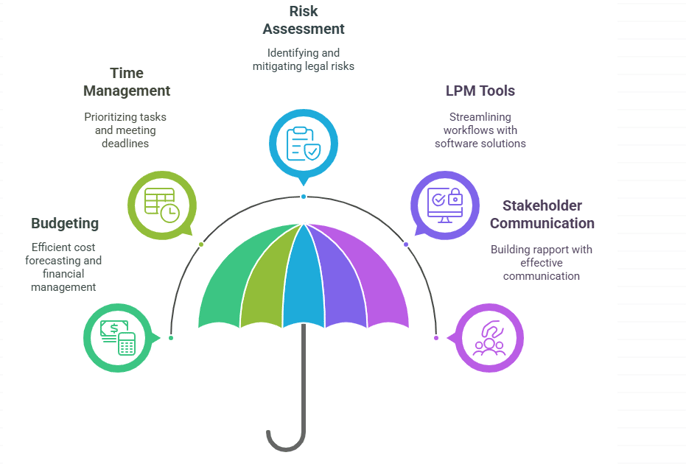
Key Topics in LPM Certification
Budgeting for Legal Projects: Efficient cost forecasting and financial management are crucial in legal projects. LPM certifications teach professionals how to manage budgets effectively, ensuring that legal services are delivered within budgeted timelines.
Time Management: Managing milestones and deliverables within strict deadlines is a hallmark of successful legal project management. LPM training helps professionals develop skills to prioritize tasks, manage time efficiently, and meet deadlines.
Risk Assessment in Legal Settings: Legal projects come with unique risks. LPM certifications focus on proactively identifying and mitigating these risks, ensuring that legal teams are prepared for any challenges that arise.
Using LPM Tools: Training with software solutions designed for the legal industry, such as Clio and Lawcus, is an integral part of LPM certifications. These tools help streamline legal workflows, enhance productivity, and improve client communication.
Stakeholder Communication: Building strong rapport with clients, teams, and regulatory bodies is vital in legal project management. LPM certifications emphasize the importance of effective communication to ensure that all stakeholders are aligned and satisfied.
Why Pursue a Legal Project Management Certification?
Obtaining a Legal Project Management Certification can profoundly impact your career. Here are some compelling reasons to consider this credential:
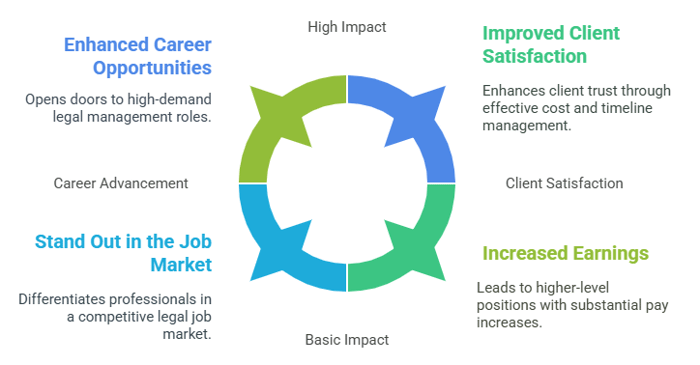
Enhanced Career Opportunities: With more legal departments adopting project management strategies, certified professionals are in high demand. This certification opens doors to roles like Legal Project Manager, Operations Manager, or Litigation Coordinator. Employers value individuals who can drive efficiency while ensuring compliance with legal mandates.
Stand Out in the Job Market: Legal professionals with project management expertise differentiate themselves in a competitive market. Certification acts as proof of your commitment to staying relevant and sharpening your skills.
Improve Client Satisfaction: Clients increasingly demand transparency and predictability when engaging legal services. By mastering LPM frameworks, you can provide better projections, manage costs effectively, and deliver results within budgeted timelines.
Increased Earnings: A Legal Project Management Certification can boost earning potential. Certified professionals often secure higher-level leadership positions and command more substantial pay packages than their non-certified peers.
Foundation for Advanced Credentials: Certifications such as the Legal Project Management Certification also prepare you for advanced credentials. For instance, many professionals build on their LPM training by completing globally-renowned programs like APMIC’s certification.
If you're wondering whether project management certification is worth it, check out Is Project Management Certification Worth It?
Advantages of Online Legal Project Management Certifications
Pursuing a Legal Project Management Certification online brings added flexibility and accessibility. Here's why online programs are worth considering:
Self-paced Learning: Online certification programs allow professionals to learn at their convenience, juggling full-time careers and personal commitments effortlessly.
Comprehensive Curriculum: Top providers like APMIC offer advanced programs covering over 400 modules, ensuring deep industry insights.
Affordability: Online certifications often cost less than their in-person counterparts without compromising the quality of training.
APMIC Legal Project Management Certification: How It Stands Out
APMIC takes a step beyond traditional LPM by offering 400+ modules focused not only on managing legal projects but also on advanced concepts like stakeholder communication and global legal compliance. This certification is suitable for professionals at all levels and includes hybrid learning models that combine the best of online and in-person experiences.
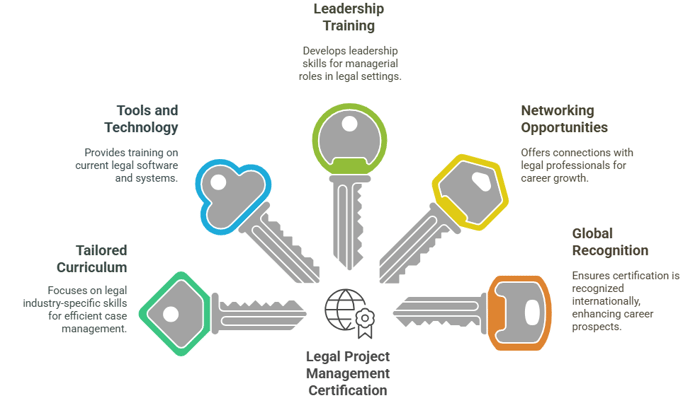
Key Features
Tailored Curriculum: Legal Project Management certifications are unique in that they are crafted specifically for the nuances of the legal industry. This ensures learners acquire expertise in managing and executing legal cases or operations efficiently.
Tools and Technology: These programs equip learners with the latest tools used in the legal field. Popular platforms covered include legal workflow systems, analytics tools, and software for document management.
Leadership Training: Beyond technical skills, LPM certifications instill leadership qualities that prepare participants for managerial roles within legal departments or law firms.
Networking Opportunities: Many LPM training providers connect participants with experienced legal professionals and organizations. Networking with peers and mentors can lead to significant career advancements.
Global Recognition: The certification’s alignment with international standards ensures its applicability across industries and borders. You’ll be equipped for management roles, not just within law firms but also corporations requiring legal departments.
To explore other top project management certifications, visit Top Project Management Certifications.
Trends Shaping Legal Project Management in 2025
As we move into 2025, several trends are poised to further expand the role and impact of LPM professionals:
Technology and AI Integration: Law firms are increasingly adopting artificial intelligence (AI) and data analytics to improve decision-making and streamline processes. AI-driven insights can assist in managing deadlines, forecasting budgets, and automating repetitive tasks, freeing LPM teams to focus on strategic initiatives.
Enhanced Accountability: Clients are pressing for greater accountability and measurable outcomes. This shift will likely drive LPM teams to establish and monitor performance metrics that ensure client expectations are met, aligning legal service delivery with quantifiable value.
Cross-functional Collaboration: Future LPM roles will continue to increase collaboration with other departments, including pricing, innovation, and practice management. By working closely with these functions, LPM professionals can enhance firm-wide efficiency and deliver tailored solutions that meet evolving client needs.
Less Commonly Known Facts About Legal Project Management
Legal Project Management is Not Just for Large Firms:
"Legal Project Management (LPM) involves managing legal projects through an organized approach that emphasizes budgeting, process management, and improved communication." – Wikipedia
LPM Involves Legal Operations Teams:
"Legal operations are the management of all aspects of legal functions, including managing legal work, processes, technology, and people." – Wikipedia
AI in LPM is More Than Just Automation:
"Artificial intelligence in legal operations is used to automate workflows and provide data-driven insights, increasing efficiency." – Wikipedia
Cross-functional Collaboration is Key:
"Legal project management often requires collaboration between different departments, including legal, IT, finance, and HR." – Wikipedia
LPM Certifications Are Global:
"Legal project management certifications are recognized worldwide, making them valuable for professionals across borders."
LPM Enhances Client Relationships:
"Legal Project Management improves client relationships by offering greater transparency and more predictable legal processes."
LPM is Not Limited to Legal Professionals:
"Legal project management is a cross-disciplinary role, not limited to lawyers, but also involving non-legal professionals such as paralegals and legal assistants." – Wikipedia
The Role of Data Analytics:
"Data analytics in legal operations is key to enhancing efficiency, decision-making, and resource management." – Wikipedia
Conclusion
A Legal Project Management Certification is a powerful tool that can elevate your career in the legal industry. Whether you're striving to lead projects with precision, strengthen client relationships, or boost your career into senior management, the skills acquired through this training are indispensable. Programs like APMIC's certification provide unmatched depth, industry focus, and flexibility for learners across the globe. By choosing the certification that aligns with your ambitions, you can transform your career in law and project management.
If you're looking to further enhance your project management skills, consider exploring the best PMP Certification Prep Course available at APMIC. This course will equip you with the knowledge and skills needed to excel in project management, setting you up for success in a rapidly evolving industry.
FAQs
What is the best certification for legal project management?
The best choice depends on your goals. APMIC offers an exceptional program with over 400 modules, blending practical skills with theoretical knowledge, making it a top recommendation.
Can I pursue this certification online?
Yes, many programs, including APMIC’s, are available online. This flexibility allows busy professionals to learn at their own pace.
How much does it cost to get certified?
Costs range from $500 to $2,000 depending on the program. Advanced certifications like APMIC's often offer payment plans to make learning more accessible.
How long does it usually take to complete?
Most programs take about 4–6 months, but self-paced options allow learners to adjust the timeline to fit their schedules.
Is financial aid offered for these programs?
Yes, many providers, including APMIC, offer financial assistance or flexible payment options to make certifications affordable.
Does this certification help with career advancement?
Definitely. Certified professionals are highly sought after by law firms, corporations, and startups, improving not only job prospects but also earning potential.



